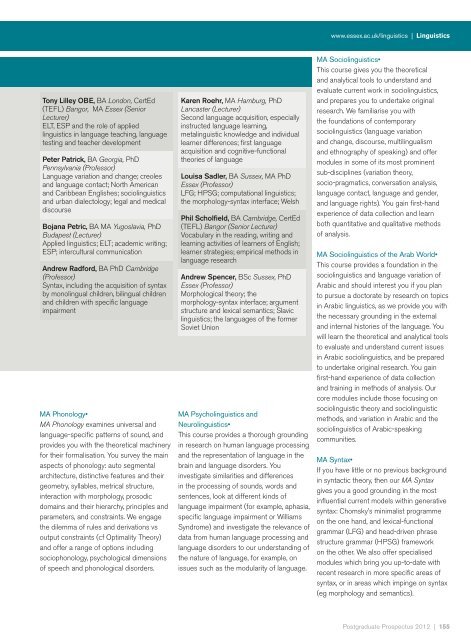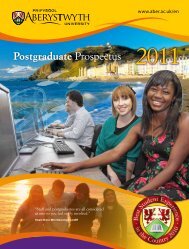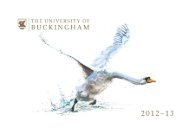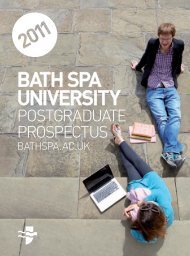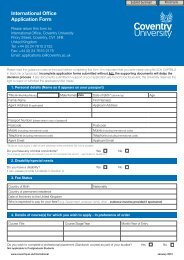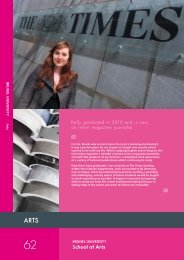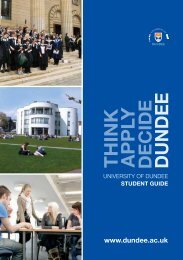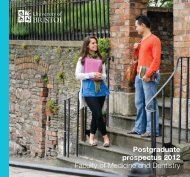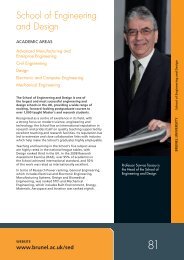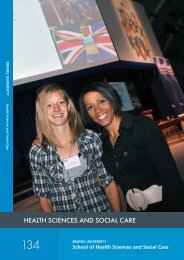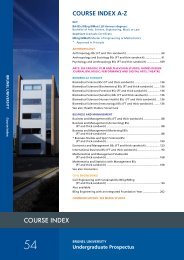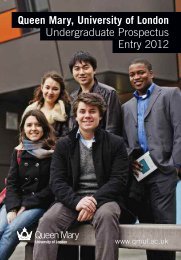Postgraduate Prospectus
Postgraduate Prospectus
Postgraduate Prospectus
Create successful ePaper yourself
Turn your PDF publications into a flip-book with our unique Google optimized e-Paper software.
www.essex.ac.uk/linguistics | Linguistics<br />
Tony Lilley OBE, BA London, CertEd<br />
(TEFL) Bangor, MA Essex (Senior<br />
Lecturer)<br />
ELT, ESP and the role of applied<br />
linguistics in language teaching, language<br />
testing and teacher development<br />
Peter Patrick, BA Georgia, PhD<br />
Pennsylvania (Professor)<br />
Language variation and change; creoles<br />
and language contact; North American<br />
and Caribbean Englishes; sociolinguistics<br />
and urban dialectology; legal and medical<br />
discourse<br />
Bojana Petric, BA MA Yugoslavia, PhD<br />
Budapest (Lecturer)<br />
Applied linguistics; ELT; academic writing;<br />
ESP; intercultural communication<br />
Andrew Radford, BA PhD Cambridge<br />
(Professor)<br />
Syntax, including the acquisition of syntax<br />
by monolingual children, bilingual children<br />
and children with specific language<br />
impairment<br />
MA Phonology•<br />
MA Phonology examines universal and<br />
language-specific patterns of sound, and<br />
provides you with the theoretical machinery<br />
for their formalisation. You survey the main<br />
aspects of phonology: auto segmental<br />
architecture, distinctive features and their<br />
geometry, syllables, metrical structure,<br />
interaction with morphology, prosodic<br />
domains and their hierarchy, principles and<br />
parameters, and constraints. We engage<br />
the dilemma of rules and derivations vs<br />
output constraints (cf Optimality Theory)<br />
and offer a range of options including<br />
sociophonology, psychological dimensions<br />
of speech and phonological disorders.<br />
Karen Roehr, MA Hamburg, PhD<br />
Lancaster (Lecturer)<br />
Second language acquisition, especially<br />
instructed language learning,<br />
metalinguistic knowledge and individual<br />
learner differences; first language<br />
acquisition and cognitive-functional<br />
theories of language<br />
Louisa Sadler, BA Sussex, MA PhD<br />
Essex (Professor)<br />
LFG; HPSG; computational linguistics;<br />
the morphology-syntax interface; Welsh<br />
Phil Scholfield, BA Cambridge, CertEd<br />
(TEFL) Bangor (Senior Lecturer)<br />
Vocabulary in the reading, writing and<br />
learning activities of learners of English;<br />
learner strategies; empirical methods in<br />
language research<br />
Andrew Spencer, BSc Sussex, PhD<br />
Essex (Professor)<br />
Morphological theory; the<br />
morphology-syntax interface; argument<br />
structure and lexical semantics; Slavic<br />
linguistics; the languages of the former<br />
Soviet Union<br />
MA Psycholinguistics and<br />
Neurolinguistics•<br />
This course provides a thorough grounding<br />
in research on human language processing<br />
and the representation of language in the<br />
brain and language disorders. You<br />
investigate similarities and differences<br />
in the processing of sounds, words and<br />
sentences, look at different kinds of<br />
language impairment (for example, aphasia,<br />
specific language impairment or Williams<br />
Syndrome) and investigate the relevance of<br />
data from human language processing and<br />
language disorders to our understanding of<br />
the nature of language, for example, on<br />
issues such as the modularity of language.<br />
MA Sociolinguistics•<br />
This course gives you the theoretical<br />
and analytical tools to understand and<br />
evaluate current work in sociolinguistics,<br />
and prepares you to undertake original<br />
research. We familiarise you with<br />
the foundations of contemporary<br />
sociolinguistics (language variation<br />
and change, discourse, multilingualism<br />
and ethnography of speaking) and offer<br />
modules in some of its most prominent<br />
sub-disciplines (variation theory,<br />
socio-pragmatics, conversation analysis,<br />
language contact, language and gender,<br />
and language rights). You gain first-hand<br />
experience of data collection and learn<br />
both quantitative and qualitative methods<br />
of analysis.<br />
MA Sociolinguistics of the Arab World•<br />
This course provides a foundation in the<br />
sociolinguistics and language variation of<br />
Arabic and should interest you if you plan<br />
to pursue a doctorate by research on topics<br />
in Arabic linguistics, as we provide you with<br />
the necessary grounding in the external<br />
and internal histories of the language. You<br />
will learn the theoretical and analytical tools<br />
to evaluate and understand current issues<br />
in Arabic sociolinguistics, and be prepared<br />
to undertake original research. You gain<br />
first-hand experience of data collection<br />
and training in methods of analysis. Our<br />
core modules include those focusing on<br />
sociolinguistic theory and sociolinguistic<br />
methods, and variation in Arabic and the<br />
sociolinguistics of Arabic-speaking<br />
communities.<br />
MA Syntax•<br />
If you have little or no previous background<br />
in syntactic theory, then our MA Syntax<br />
gives you a good grounding in the most<br />
influential current models within generative<br />
syntax: Chomsky’s minimalist programme<br />
on the one hand, and lexical-functional<br />
grammar (LFG) and head-driven phrase<br />
structure grammar (HPSG) framework<br />
on the other. We also offer specialised<br />
modules which bring you up-to-date with<br />
recent research in more specific areas of<br />
syntax, or in areas which impinge on syntax<br />
(eg morphology and semantics).<br />
<strong>Postgraduate</strong> <strong>Prospectus</strong> 2012 | 155


